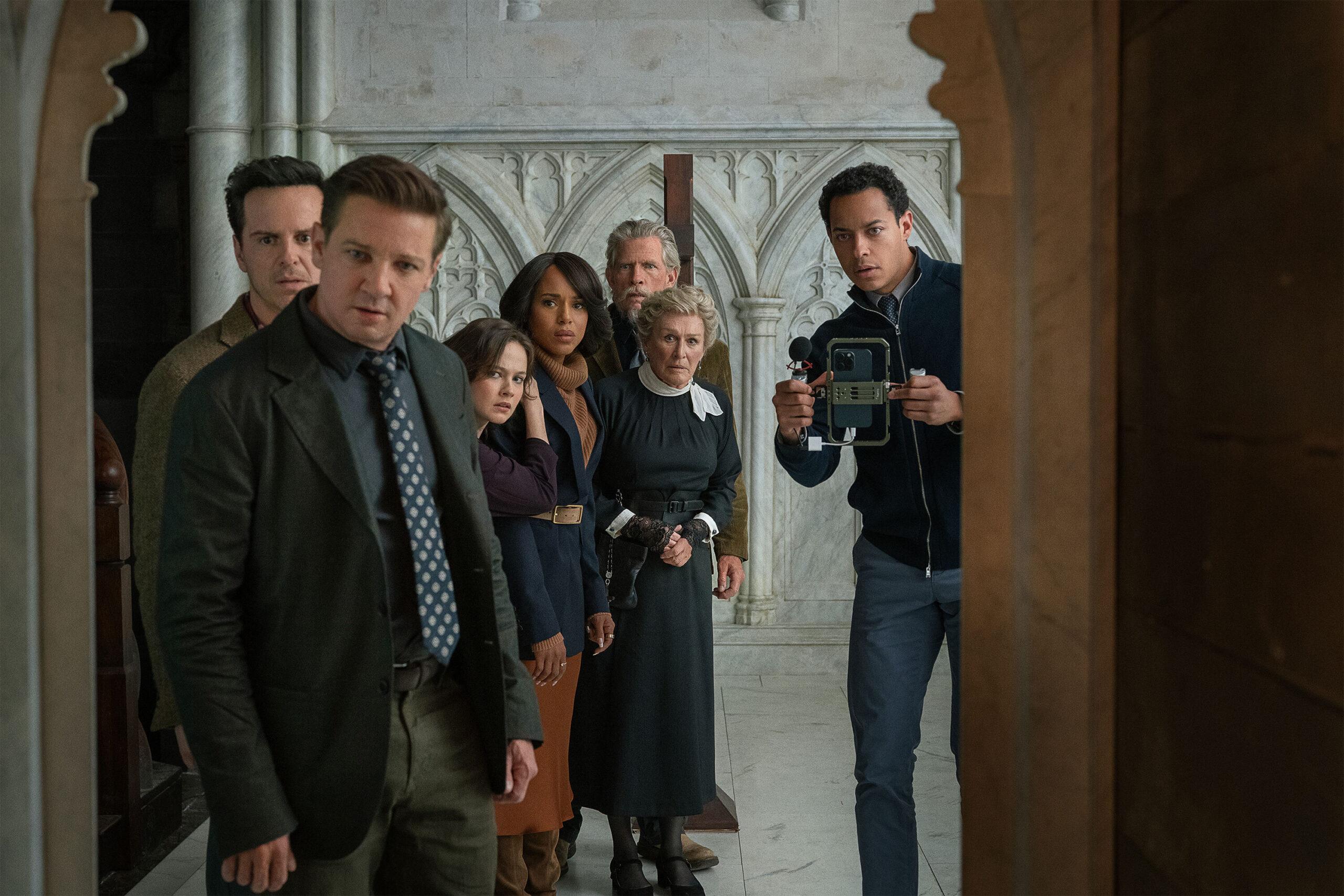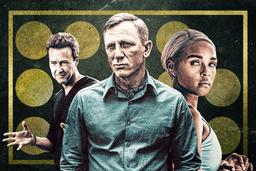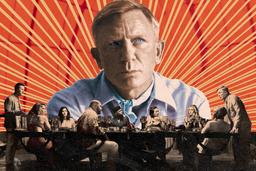Playing an idealistic but anxious young priest in Rian Johnson’s Wake Up Dead Man, Josh O’Connor furrows his brow and angles his lanky body into a prizefighter’s stance. His character, Jud Duplencity, is a former boxer with an accidental in-ring death on his conscience—shades of Jason Miller’s Father Karras in The Exorcist, another flawed man of the cloth who battered the heavy bag in between encounters with Pazuzu.
There’s something potent in O’Connor’s posture as a spiritual warrior, especially one who struggles with impulse control. As the film opens, we learn that Jud has been transferred to an isolated parish in upstate New York, a punishment for swinging at a colleague and also a test of resolve. Walking through the grayed-out grounds of Our Lady of Perpetual Fortitude, Father Jud looks more resigned than excited; his hands are down, and his guard is up.
There are plenty of reasons, it seems, to be defensive. Jud’s new boss, the notorious Monsignor Jefferson Wicks (Josh Brolin), is an expressly pugilistic sort of preacher—a heavyweight who likes to throw haymakers from the pulpit and hit below the belt in person. His arsenal includes all kinds of cheap shots, to which Jud is inclined—and duty bound—to turn the other cheek, especially since the members of the monsignor’s flock seem inured to being on the receiving end of such two-fisted religiosity. Wicks isn’t just the ruling authority at the church. He was born into its leadership and lords over the premises accordingly. He’s more inclined to lash out at his followers than mollify them, and there are plenty of sore points among them to jab at: The regulars include a philandering, alcoholic physician (Jeremy Renner); a stifled sci-fi writer (Andrew Scott); a wheelchair-bound musician (Cailee Spaeny); a sleek lawyer saddled with family shame (Kerry Washington); and an ascendant alt-right influencer (Daryl McCormack).

It’s a motley bunch, united by a feeling of being on the short end of the stick. Their resentment places them in thrall to Wicks’s Old Testament persona, which is big on apportioning blame and doling out suffering. This servile dynamic goes double for Martha (Glenn Close), who, like the monsignor, is a long-tenured (and personally invested) member of Our Lady of Perpetual Fortitude and whose loyalty in the face of so much hateful eye-for-an-eye rhetoric hints that she’s less benevolent than she lets on.
Cue the impending 12-round title bout between the reigning champ and the no. 1 contender for the right to spread the good word through Albany and beyond. Jud may be overmatched, but he’s willing, at least, to go down swinging. And then, suddenly, Wicks takes a dive; he’s dispatched by an unseen assailant during a Good Friday sermon in a way that beggars belief for superstitious and secular types alike. The circumstances of his death are so strange, in fact—stabbed in the back in a closet with no access point—that they prompt national media attention. The cops, it goes without saying, are baffled; it falls to Jud, who was standing onstage in full view of the churchgoers at the moment of truth—a position that seemingly places him beyond suspicion, despite his obvious motive—to sort through the confusion of the case and his own interlacing sensations of guilt and gratitude that somebody has gone and taken a false and probably dangerous prophet out of the picture.
It’s at this point in Wake Up Dead Man—about 45 minutes into its leisurely two-and-a-half-hour running time—that Benoit Blanc arrives and drawlingly transforms the proceedings into a Knives Out Mystery: a format whose familiarity breeds (streaming) content. Where previous installments suggested Johnson’s gift for pretzel-like convolution—a carryover from his virtuosic pocket-noir debut, Brick—entry no. 3 demonstrates his riskiest and most sophisticated play with structure and audience identification. It takes guts to not only delay the arrival of Daniel Craig’s star detective but also then consign him, more or less, to sidekick status—like Sherlock Holmes cosplaying as Dr. Watson.
The point is not that the franchise needs less of Benoit Blanc: He’s a wonderful character, played by Craig with considerably more buy-in than he brought to the last couple of Bond outings. It’s more that Johnson’s self-contained murder-most-foul conceit is by now spacious enough to accommodate not only those rotating A-list ensembles but also varying approaches to world-building and storytelling. That this is probably the best of the Knives Out films speaks to its maker’s personal investment. In interviews, Johnson has said that crafting Wake Up Dead Man was more arduous than expected, owing in part to his own religious upbringing—a trickier proposition than crafting an airtight locked-room mystery à la John Dickson Carr. “The real reason the script was so hard to write," Johnson told Empire, “[is that] it’s [about] something I do take really seriously. I wanted to explore it in a really honest way, while also not being facile about it, or—God forbid—moralistic or irreverent.”
That’s a tall order, especially given the riling hipster–Agatha Christie mandate of the Knives Out series—a formula that lends itself to moralism and irreverence in equal measure. Johnson’s ambivalence about his roots may be real, but it can’t fully transubstantiate his sensibility from former Star Wars helmer into the second coming of Robert Bresson. That The Last Jedi became such a lightning rod for haters speaks more to a congenitally thin-skinned and baby-brained section of Star Wars fandom than to any substantial provocation on the director’s part. His specialty lies elsewhere, in a form of broad, satisfyingly anodyne showmanship. Johnson enjoys crafting anything-can-happen premises and then bouncing exaggerated zeitgeist types off one another. It’s like he writes his ensembles with a checklist in mind: How many right-wing bogeymen can he cut down to size? Glass Onion in particular was teeming with such types—including and especially Edward Norton’s glib tech-bro villain—and was peppered with righteous hold-for-applause speeches about the need for resistance and disruption and smashing the system, sentiments that didn’t exactly hold in the context of a glossy, cozy thriller.
Wake Up Dead Man has plenty of fun setting fire to its own obvious and contemptible straw man: Between this movie and his demonic network honcho in The Running Man, Brolin has styled himself as the grinning face of authoritarian deplorability. He makes Monsignor Wicks entertainingly nasty—a wolf who doesn’t even bother to don sheep’s clothing—and duly whets our appetite to see him struck down (by God or anybody else). But what really helps the film bridge the gap between topical critique and solid, built-to-last drama is O’Connor’s lead performance, which combines with his work in The Mastermind to make him something like 2025’s actor of the year.
Playing a shortsighted wannabe outlaw in Kelly Reichardt’s rueful, deconstructed heist movie, O’Connor hollowed out his own charisma, drawing a blank and making it work as portraiture. Wake Up Dead Man obliges him to build his character a different way, from the inside out, with his heart on his cassock: to inhabit the dual extremes of narcissism and humility that motivate a man of the cloth to take the whole world onto his shoulders. The movie’s plot points may be manufactured, but O’Connor’s soulfulness is organic. He carries the movie as far as he can and speaks something fresh into Craig’s acting, which is as enjoyably flamboyant as ever but also taps a potent reservoir of secular anguish and doubt. Where in the past the character has signified merely as a larger-than-life supersleuth—a coy, playfully Americanized version of Hercule Poirot—Wake Up Dead Man gives him his own road-to-Damascus arc. By now, Craig can probably do the goofier stuff in his sleep, but he ably conveys the desire of a nonbeliever to finally connect with a mystery bigger than the question of whodunnit.
On that point: While Wake Up Dead Man’s construction is sound, with intricate, crisscrossing story lines atop plenty of solid, load-bearing, capital-T Themes, it’s also extremely predictable, with a wrap-up that’s hiding in plain sight from the very beginning. There’s a lot of explanation of thriller clichés and mechanics in Blanc’s monologues, a sign of a writer who’s pleased with his own frame of reference; at the same time, the script does its best to play fair, swapping out shock value for a carefully finessed emotional payload that hits despite its obviousness and transcends the cartoon-caricature excess of one pivotal, potentially Oscar-bound supporting performance. (If the actor in question is so honored, it’ll be under the sign of lifetime achievement.) The slightly enervating tidiness of Wake Up Dead Man is a by-product of Johnson’s immaculate conceptions: the way he reverse engineers his enigmas from the solution to show off his cleverness at mapping them out in the first place. For his next trick, maybe he’ll find a way to truly flummox Benoit Blanc and his audience with a crime scene that’s beyond understanding. For now, though, he’s done well enough to keep the crowd pleased.





